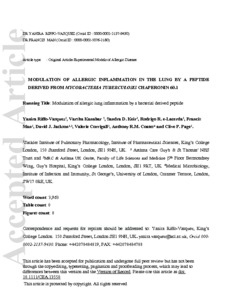Riffo-Vasquez, Y; Kanabar, V; Keir, SD; E-Lacerda, RR; Man, F; Jackson, DJ; Corrigall, V; Coates, ARM; Page, CP
(2020)
Modulation of allergic inflammation in the lung by a peptide derived from Mycobacteria tuberculosis chaperonin 60.1.
Clin Exp Allergy, 50 (4).
pp. 508-519.
ISSN 1365-2222
https://doi.org/10.1111/cea.13550
SGUL Authors: Coates, Anthony Robert Milnes
![[img]](https://openaccess.sgul.ac.uk/111544/1.hassmallThumbnailVersion/Riffo-Vasquez_et_al-2019-Clinical_%26_Experimental_Allergy.pdf)  Preview |
|
PDF
Accepted Version
Available under License ["licenses_description_publisher" not defined].
Download (14MB)
| Preview
|
Abstract
Background
We have previously demonstrated that Mycobacteria tuberculosis chaperonin 60.1 inhibits leucocyte diapedesis and bronchial hyperresponsiveness in a murine model of allergic lung inflammation.
Methods
In the present study, we have investigated the effect of a shorter peptide sequence derived from Cpn 60.1, named IRL201104, on allergic lung inflammation induced by ovalbumin (OVA) in mice and by house dust mite (HDM) in guinea pigs, as well as investigating the action of IRL201104 on human cells in vitro.
Results
Pre‐treatment of mice or guinea pigs with IRL201104 inhibits the infiltration of eosinophils to the lung, cytokine release, and in guinea pig skin, inhibits allergen‐induced vascular permeability. The protective effect of intranasal IRL201104 against OVA‐induced eosinophilia persisted for up to 20 days post‐treatment. Moreover, OVA‐sensitized mice treated intranasally with 20 ng/kg of IRL201104 show a significant increase in the expression of the anti‐inflammatory molecule ubiquitin A20 and significant inhibition of the activation of NF‐κB in lung tissue. Our results also show that A20 expression was significantly reduced in blood leucocytes and ASM obtained from patients with asthma compared to cells obtained from healthy subjects which were restored after incubation with IRL201104 in vitro, when added alone, or in combination with LPS or TNF‐α in ASM.
Conclusions
Our results suggest that a peptide derived from mycobacterial Cpn60.1 has a long‐lasting anti‐inflammatory and immunomodulatory activity which may help explain some of the protective effects of TB against allergic diseases.
Statistics
Item downloaded times since 06 Jan 2020.
Actions (login required)
 |
Edit Item |



